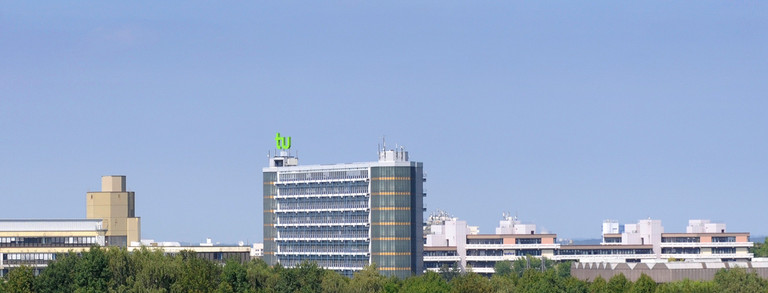German Media Report on Covid-19 Testing at TU Dortmund University
- Service
- Top News
- Studying & Teaching at TU Dortmund University
- Press Releases

President Manfred Bayer made it clear why TU Dortmund University decided early on to develop a testing strategy for the summer semester: “It’s important that students do not lose a further semester through cancelled practical classes. At the same time, we need to protect the campus, which already displays a low infection rate, from the spread of the virus.” This was not just a matter of coordinated testing, he continued, but also of responding proactively in the event of infections: “We must be in a position to follow up contacts quickly and, if there is any doubt, from time to time send students from a whole course into voluntary quarantine. Of course, social distancing and hygiene rules continue to apply,” he said.
TU Dortmund University as model for No Covid strategy
The No Covid initiative has shown repeatedly in a number of publications how a pandemic can be fought effectively by means of a combination of testing, contact tracing and hygiene rules. Co-founder Matthias Schneider, Professor of Medical and Biological Physics at TU Dortmund University, explained why TU Dortmund University has a model character from the perspective of No Covid. “To have a chance of coming out of this crisis, we must act locally, quickly and proactively,” he stressed. “An intelligent testing strategy is essential. At TU Dortmund University, we want to offer students and staff a combination of PCR and self-tests: one to three times a week, depending on the number of days they are present on campus. We also offer students and staff advice and support should they have to self-isolate.”
Resumption of laboratory classes
The Faculty of Chemistry and Chemical Biology already started testing this week. The faculty’s laboratory classes are among those in-person courses allowed by way of exception in line with current rules. “Practical classes in the framework of chemistry studies can only take place in the lab and with the equipment on site; there is no equivalent online substitute,” explains Dr. Sebastian Zühlke. The faculty’s Deputy Covid-19 Response Officer had already taken part in the first trial run for testing on campus in March with a group of 14 students as well as supervisors. “In the process, we tried out both PCR as well as antigen tests. Testing is really quick and easy, so everyone can join in,” he says.
Support for students and staff
Testing is voluntary. Unlike in schools, no mandatory testing is currently foreseen for universities in North Rhine-Westphalia. To put people’s minds at rest about testing, TU Dortmund University wants to support its students and staff as well as it can in the event of a positive test result. Where possible, self-tests should be conducted beforehand at home, accompanied by video monitoring. In this way, supervisors can ensure that the test is performed correctly, document a positive result, and advise on the next steps. Under certain circumstances, a sample for the PCR test can be collected by TU Dortmund University’s transport service so that the result can be checked. Guidelines for contact tracing are currently being compiled, and there will also be advisory services for people in quarantine. Students and staff are requested to help self-isolating fellow students and colleagues with their shopping in the case that above all new arrivals do not yet have a local social network. In addition, the Psychological Student Advisory Service offers daily consultation hours for people in quarantine.
TU Dortmund University is transparent in its communications regarding infections on campus: It reports the number of tests and the number of positive cases each week on its website. In the pilot phase, around 300 tests have been carried out so far, none of which were positive. For the summer semester, a demand of over 100,000 tests between April and August can be expected. As the first large delivery of self-tests is expected in the first week of the lecture period, testing can increase step by step from the following week onwards. The faculties and institutions as well as central administration will inform their members promptly about times and dates. All students and staff who need to be present on campus for classes, research work or administrative tasks can be tested.





![[Translate to English:] Partner Four hands are holding the green logo of TU Dortmund University](/storages/tu_website/_processed_/1/d/csm_Partner_Nicole_Rechmann_KW_670eba0154.jpg)




![[Translate to English:] Forschung An apparatus with tubes in a laboratory](/storages/tu_website/_processed_/0/c/csm_Forschung_Juergen_Huhn_4fa3153b51.jpg)
![[Translate to English:] Studium Five students are sitting in a lecture hall. They are talking to each other.](/storages/tu_website/_processed_/c/9/csm_Studium_FelixSchmale_dbdbfb0dd7.jpg)

















